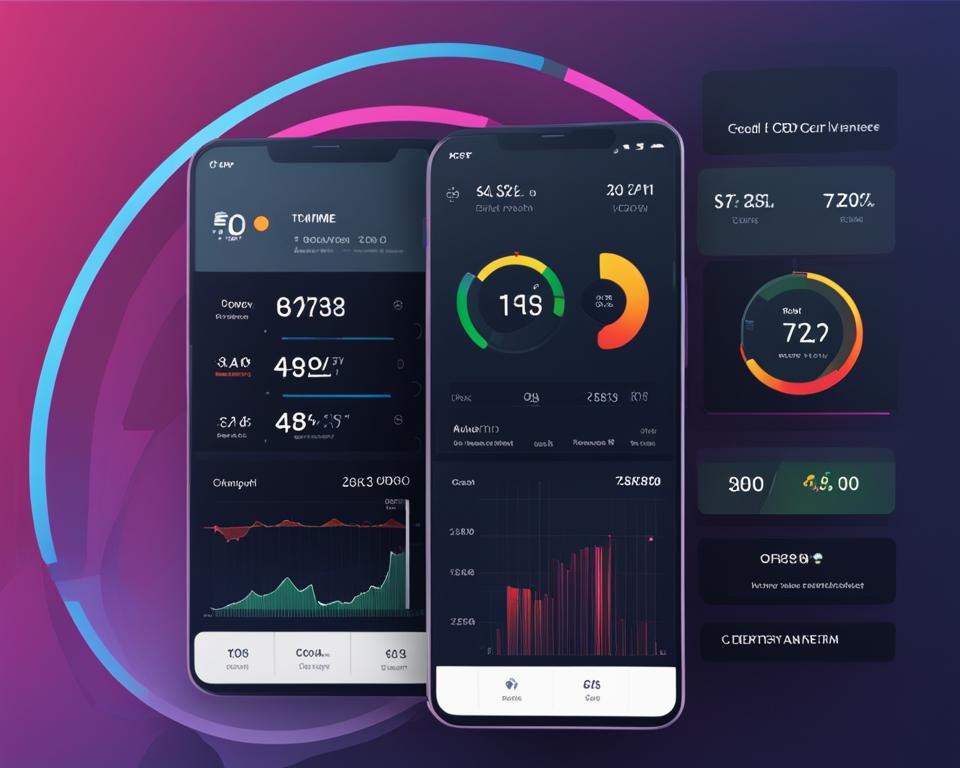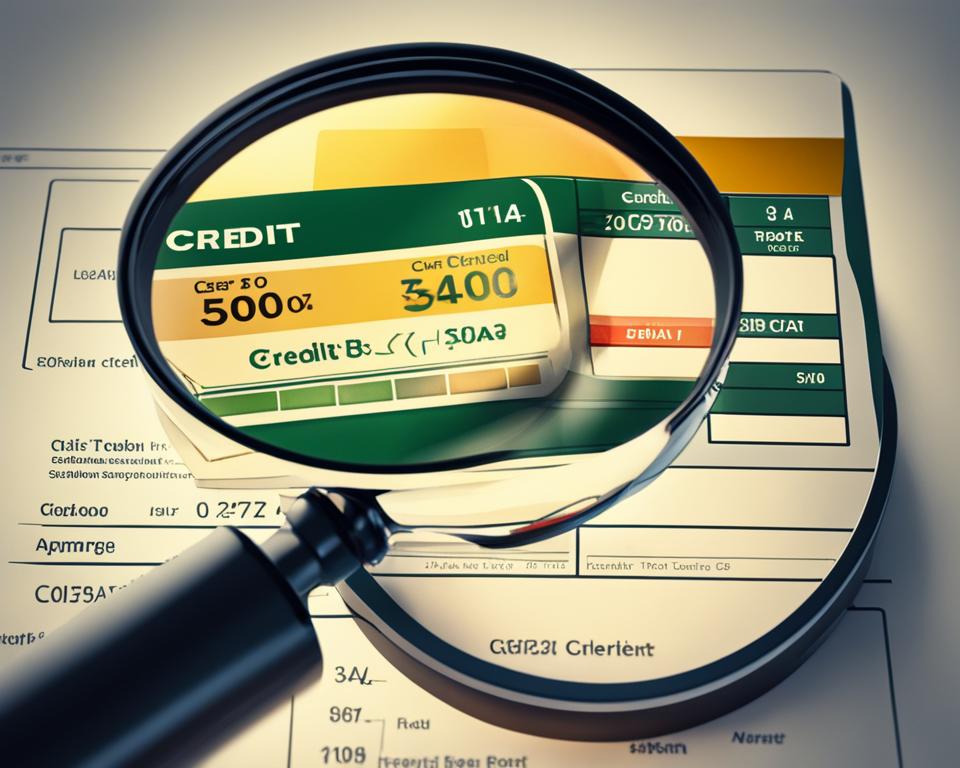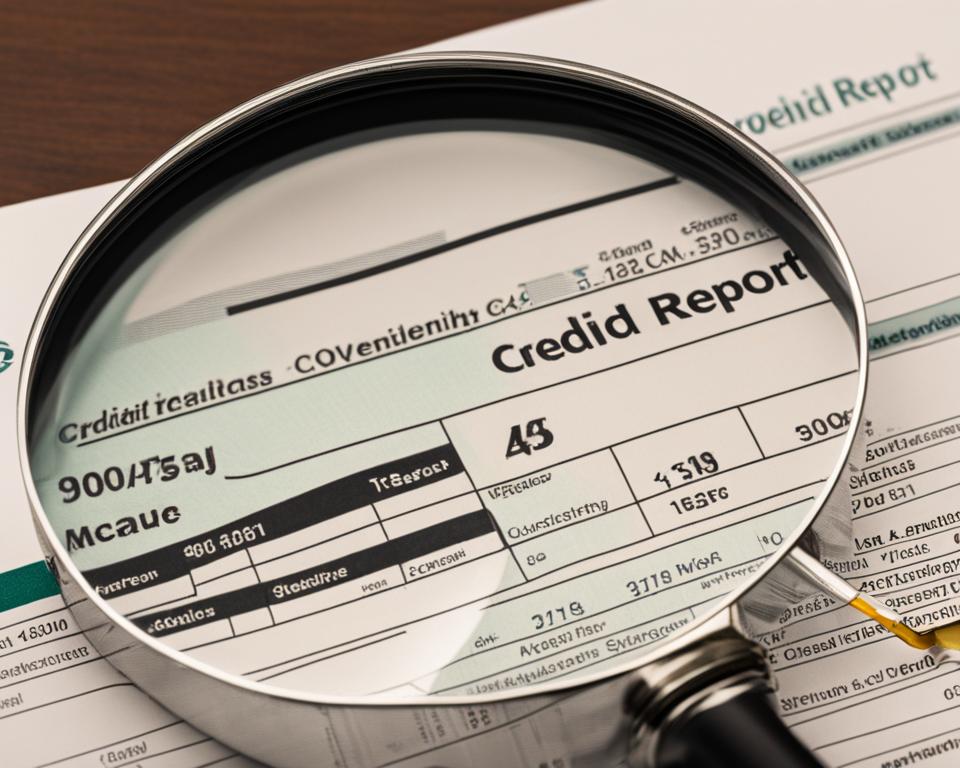When it comes to credit scores, accuracy is key. Lenders, landlords, and insurers rely on credit scores to make important decisions that can impact your financial future. But which credit bureau is the most accurate? Equifax, TransUnion, or Experian?
In reality, all three major credit bureaus generate accurate credit scores based on the information in your credit report. However, the primary credit scoring models used by lenders are FICO and VantageScore, and both models are equally accurate in assessing creditworthiness.
It’s important to understand the different credit scores and their accuracy to ensure you make informed credit decisions. Let’s explore the intricacies of credit scoring and the factors that contribute to a reliable credit assessment.
Key Takeaways:
- All three major credit bureaus – Equifax, TransUnion, and Experian – generate accurate credit scores.
- The primary credit scoring models used by lenders are FICO and VantageScore, and both models are equally accurate.
- Understanding your credit history and regularly monitoring your credit report are essential for ensuring accuracy.
- Inaccuracies can lead to discrepancies in credit scores, which can be resolved through the credit dispute process.
- Maintaining a good credit score can open doors to better financial opportunities.
Understanding Credit Scores and Reports
A credit report contains vital information about your credit history and current credit situation. It serves as a detailed record of your borrowing and repayment activities, including credit card usage, loans, mortgages, and any other financial obligations. The three major credit bureaus – Equifax, TransUnion, and Experian – compile and maintain your credit report.
Based on the information contained in your credit report, these credit bureaus generate your credit score. Your credit score is a numerical representation of your creditworthiness and is used by lenders to assess your risk as a borrower. However, your credit score is only as accurate as the information in your credit report. Inaccuracies or discrepancies in your credit report can lead to errors in your credit score.
To ensure the accuracy of your credit score, it is crucial to regularly check your credit report. By reviewing your credit report, you can verify that all the information is correct and up-to-date. This includes confirming that your personal details, such as your name, address, and employment information, are accurately reflected in the report.
Checking your credit report allows you to identify any potential errors or discrepancies that may be impacting your credit score negatively. Inaccuracies such as incorrect payment history, fraudulent activity, or erroneous credit limits can significantly affect your creditworthiness and financial opportunities.
Table: Common Credit Report Inaccuracies
| Inaccuracy | Description |
|---|---|
| Incorrect personal information | Mistakes in names, addresses, or employment details |
| Accounts not belonging to you | Inclusion of accounts that are not yours |
| Unauthorized credit inquiries | Requests for credit that you did not initiate |
| Late payments | Incorrect reporting of late payments |
| Closed accounts still listed as open | Failure to update closed accounts |
| Debt not showing as paid | Failure to report paid-off balances |
If you find any errors or inaccuracies in your credit report, you have the right to dispute them. Credit bureaus are required by law to investigate and correct any disputed information that is found to be incorrect. By resolving inaccuracies, you can ensure that your credit report is an accurate reflection of your credit history, leading to a more precise credit score.
How to Check Credit Report Accuracy:
To check the accuracy of your credit report, follow these steps:
- Visit AnnualCreditReport.com, which is the official website authorized by the Federal Trade Commission (FTC), to access your free credit reports from Equifax, TransUnion, and Experian once every 12 months.
- Request a credit report from each of the three credit bureaus.
- Review each credit report carefully and compare the information provided to your personal records.
- Take note of any discrepancies, errors, or outdated information.
- If you identify any inaccuracies, file a dispute with the relevant credit bureau(s) and provide supporting documentation to substantiate your claim.
- The credit bureau will investigate the disputed information, and if found to be incorrect, update your credit report accordingly.
Regularly checking your credit report and score is essential to ensure their accuracy and protect your financial well-being. By proactively monitoring your credit, you can address any inaccuracies promptly and maintain a healthy credit profile.
The FICO Scoring Model
The FICO scoring model, created by Fair Isaac, is widely recognized as the industry standard for assessing an individual’s creditworthiness. This model evaluates borrowers based on five key factors: payment history, amounts owed, length of credit history, credit mix, and new credit. FICO scores are highly regarded by lenders, with 90% of them using the FICO scoring model to make loan decisions.
FICO scores place significant emphasis on payment history, as it provides insight into how consistently borrowers meet their financial obligations. Lenders consider individuals with a strong track record of on-time payments to be less risky, resulting in higher credit scores.
In addition, FICO scores take into account credit utilization, which refers to the amount of credit being used relative to the total available credit. Lower credit utilization ratios indicate responsible borrowing habits and can positively impact credit scores.
While the FICO scoring model considers various factors, payment history and credit utilization are particularly influential in determining an individual’s creditworthiness. Maintaining a positive payment history and keeping credit card balances low are key strategies for improving FICO scores.
In summary, the FICO scoring model plays a vital role in assessing borrowers’ creditworthiness. By understanding how this model evaluates credit-related factors, individuals can take the necessary steps to improve their FICO scores and enhance their financial opportunities.

Key Factors in the FICO Scoring Model:
| Factor | Description |
|---|---|
| Payment History | Assesses the borrower’s track record of on-time payments. |
| Amounts Owed | Evaluates the borrower’s credit utilization and debt levels. |
| Length of Credit History | Takes into account the age of the borrower’s credit accounts. |
| Credit Mix | Considers the various types of credit accounts the borrower has. |
| New Credit | Examines the borrower’s recent credit inquiries and new accounts. |
The VantageScore Scoring Model
The VantageScore scoring model, developed by Equifax, TransUnion, and Experian, is another widely used method of assessing creditworthiness. Similar to the FICO scoring model, VantageScore takes into account various factors such as payment history, credit utilization, length of credit history, credit mix, and new credit. However, it applies slightly different weightings to these factors, resulting in potential variations in credit scores.
The most commonly used version of VantageScore is VantageScore 3.0. While FICO scores are preferred by most lenders, VantageScore scores can still provide accurate assessments of an individual’s creditworthiness. By considering different aspects of an individual’s credit history, VantageScore offers an alternative perspective on creditworthiness, offering more comprehensive insights for lenders and borrowers alike.
To better understand the differences between the FICO and VantageScore scoring models, let’s compare the weightings assigned to key factors:
| Scoring Factors | FICO Scoring Model | VantageScore Scoring Model |
|---|---|---|
| Payment History | 35% | 40% |
| Credit Utilization | 30% | 20% |
| Length of Credit History | 15% | 21% |
| Credit Mix | 10% | 11% |
| New Credit | 10% | 5% |
Note: The percentage values in the table represent the weightings assigned to each factor in the respective scoring models.
While both scoring models take into consideration similar factors, the variations in weightings can lead to different credit scores. Therefore, it’s important to understand which scoring model your lender uses and the specific factors they prioritize when evaluating creditworthiness.
Now that we’ve explored the VantageScore scoring model, let’s move on to section 5 to further understand the differences between FICO and VantageScore.
Differences in Scoring Models
When it comes to credit scoring models, there are notable differences between FICO and VantageScore. These differences lie in the weightings of the scoring factors, which can lead to variations in credit scores generated by the two models.
FICO scores place a greater emphasis on payment history and amounts owed. This means that your track record of making payments on time and the amount of debt you have will have a significant impact on your FICO score. On the other hand, VantageScore places more emphasis on credit utilization, which refers to the amount of available credit you are using. This means that a high credit utilization ratio can negatively affect your VantageScore.
To illustrate the differences, let’s take a closer look at how these models evaluate credit factors:
| Scoring Factor | FICO | VantageScore |
|---|---|---|
| Payment History | High Importance | Considerable Importance |
| Amounts Owed | High Importance | Moderate Importance |
| Length of Credit History | Moderate Importance | Moderate Importance |
| Credit Mix | Moderate Importance | Moderate Importance |
| New Credit | Moderate Importance | Moderate Importance |
| Credit Utilization | Considerable Importance | High Importance |
As you can see, FICO scores prioritize payment history and amounts owed, while VantageScore places more emphasis on credit utilization. This means that individuals with different credit usage patterns may receive varying scores from these models.
It’s important to note that both FICO and VantageScore are accurate in assessing creditworthiness. The differences in the weightings of scoring factors simply provide lenders with varying perspectives on an individual’s credit profile.
Understanding these differences can be valuable when interpreting your credit score. It’s also worth noting that even though FICO scores are more commonly used by lenders, VantageScore scores can still provide accurate assessments of your creditworthiness.
Next, we’ll explore how credit scores can vary when generated by different credit bureaus.
Credit Scores from Different Bureaus
When it comes to credit scores, it’s important to understand that each credit bureau generates its own score based on the information found in your credit report. While Experian is the largest credit bureau, all three bureaus – Equifax, TransUnion, and Experian – provide equally accurate scores based on the data reported to them.
Variations in credit scores from different bureaus can occur due to several factors:
- Different Processing Dates: Since credit information is constantly being updated, the credit bureaus may have different processing dates for the data they receive. This can result in slight variations in credit scores at any given time.
- Scoring Models Used: Each credit bureau may use a slightly different scoring model to calculate credit scores. While the basic factors considered are the same, such as payment history, credit utilization, length of credit history, credit mix, and new credit, the weightings assigned to these factors may vary.
- Errors on the Credit Report: Inaccuracies or errors on your credit report can also lead to discrepancies in credit scores. It’s essential to review your credit report regularly and dispute any incorrect information to ensure that your credit scores accurately reflect your creditworthiness.
Overall, the credit scores provided by the different bureaus are equally accurate when based on the same credit report data. However, due to the factors mentioned above, it’s normal to see some variation in scores from bureau to bureau.
To illustrate this further, take a look at the following table:
| Credit Bureau | Score Range | Differences |
|---|---|---|
| Equifax | 300-850 | … |
| TransUnion | 300-850 | … |
| Experian | 300-850 | … |
“The credit scores provided by the different bureaus are equally accurate when based on the same credit report data.”
By understanding how credit scores are generated by different bureaus and the various factors that can influence their variations, you can have a clearer understanding of your overall credit profile. Regularly monitoring your credit scores from all three bureaus can help you stay on top of any changes and ensure that your credit information remains accurate.
Reasons for Score Discrepancies
Score discrepancies can occur for several reasons. Understanding these reasons can help you navigate credit score variations and make informed financial decisions. Here are the key factors that can contribute to score discrepancies:
Different Processing Dates
Score variations can occur if the credit bureaus have different processing dates for updating your credit information. This means that your credit report may reflect different changes at different times, leading to variations in the scores generated. It’s important to keep in mind that credit scores are not static and can change frequently.
Different Scoring Models
Credit bureaus may use different scoring models to calculate credit scores. While the FICO scoring model is widely used, other bureaus may employ alternative models such as VantageScore. These models may assign different weights to various credit factors, resulting in score variations. For example, FICO scores prioritize payment history and amounts owed, while VantageScore emphasizes credit utilization.
Errors on Your Credit Report
Errors on your credit report can significantly impact your credit scores. Inaccurate or outdated information, such as accounts that don’t belong to you or incorrect payment histories, can lead to discrepancies in the scores calculated by different bureaus. To ensure the accuracy of your credit scores, it’s crucial to regularly review your credit report for any errors and dispute them with the relevant credit bureau.
Investigating significant score discrepancies and addressing any errors or discrepancies on your credit report can help you maintain accurate credit scores. Remember, your credit score is a crucial factor in various financial decisions, so it’s essential to take proactive steps to ensure its accuracy.
| Reasons for Score Discrepancies | Description |
|---|---|
| Different Processing Dates | Variations in score due to differences in updating credit information |
| Different Scoring Models | Variations in score due to different weightings of credit factors |
| Errors on Your Credit Report | Inaccurate or outdated information impacting credit scores |

Investigating and addressing score discrepancies can help ensure the accuracy of your credit scores and empower you to make informed financial decisions.
Importance of Regularly Checking Your Credit
Regularly checking your credit report and score is essential to ensure their accuracy and identify any potential errors or discrepancies. By staying informed about your credit status, you can take proactive steps to maintain a healthy credit profile and address any issues that may arise.
The Fair Credit Reporting Act grants you the right to receive a free copy of your credit report once a year from each of the three major credit bureaus: Equifax, TransUnion, and Experian. This allows you to review the information reported and verify its accuracy. Checking your credit report can help you detect any unauthorized accounts, incorrect personal information, or fraudulent activity.
In addition to checking your credit report, it is equally important to regularly monitor your credit score. Your credit score reflects your creditworthiness and is used by lenders to assess your eligibility for loans, credit cards, and other financial products.
“Regularly checking your credit report and score can help you ensure their accuracy and identify any potential errors or discrepancies.”
Benefits of Regular Credit Monitoring
By monitoring your credit score, you can:
- Stay aware of any changes or fluctuations in your credit score
- Identify any potential issues or red flags that may impact your creditworthiness
- Take timely action to correct any inaccuracies or address negative items on your credit report
- Protect yourself against identity theft or fraudulent activity
Credit monitoring services offer a convenient way to keep track of your credit score. These services provide alerts and notifications when there are changes to your credit file, such as new accounts, inquiries, or late payments. Being aware of these changes allows you to address them promptly and protect your credit standing.
Monitoring Your Credit: A Smart Financial Habit
Checking your credit report and score regularly is not only important for maintaining accuracy but also for managing your financial well-being. By staying informed about your credit status, you can make informed decisions, such as applying for loans when the timing is right or taking steps to improve your credit.
Remember, your credit score is not a static number. It can change over time based on your credit behaviors and the information reported by creditors to the credit bureaus. By regularly checking your credit report and score, you can ensure that you are on the right track and make adjustments if necessary.
| Benefits of Regular Credit Monitoring | Importance of Regular Credit Checks |
|---|---|
| Stay aware of changes to your credit profile | Detect and correct errors or discrepancies |
| Identify potential issues or red flags | Address negative items on your credit report |
| Protect against identity theft or fraudulent activity | Make informed financial decisions |
Best Ways to Monitor Your Credit
Monitoring your credit is an essential part of managing your financial well-being. By keeping a close eye on your credit, you can detect any errors, identify fraudulent activity, and ensure the accuracy of your credit score. There are several effective methods to monitor your credit, including:
- Free Credit Score Services: Services like Credit.com offer free access to your credit score without any negative impact on your credit. You can regularly check your score to track your progress and identify any changes.
- Credit Report Card: Credit.com also provides a free credit report card that offers a detailed overview of your credit health. It highlights the factors impacting your score and provides insights to help you improve your creditworthiness.
- Credit Monitoring Services: Consider utilizing credit monitoring services like SoFi’s ExtraCredit. These services provide ongoing monitoring of your credit and send alerts for any changes, such as new accounts or fraudulent activity. ExtraCredit even provides FICO scores to give you a comprehensive understanding of your creditworthiness.
By utilizing these methods, you can stay proactive in monitoring your credit and ensure the accuracy of your credit score. Regularly checking your credit is crucial for identifying any issues early on and taking the necessary steps to address them.
| Method | Benefits |
|---|---|
| Free Credit Score Services | Access your credit score without any negative impact on your credit. Track your credit progress over time. |
| Credit Report Card | Receive a detailed overview of your credit health. Understand the factors impacting your score. Gain insights to improve your creditworthiness. |
| Credit Monitoring Services | Continuously monitor your credit for changes. Receive alerts for new accounts or fraudulent activity. Access comprehensive FICO scores for a holistic view of your creditworthiness. |

Stay on top of your credit health by using these best practices for credit monitoring. The peace of mind and financial control they provide are invaluable in today’s credit-driven world.
Building a Strong Credit History
Building a strong credit history is crucial for maintaining a good credit score. To achieve this, it is essential to follow some key practices:
- Make Payments On Time: Timely payments show lenders that you are responsible and reliable. Set up payment reminders or automatic payments to ensure you never miss a due date.
- Pay Down Revolving Credit: Paying down your revolving credit, such as credit card balances, can significantly improve your credit score. Aim to keep your credit utilization below 30% of your available credit limit.
- Be Selective About Opening New Accounts: Opening too many accounts within a short period can negatively impact your credit score. Only open new accounts when necessary and carefully consider your credit needs.
By consistently practicing these habits, you can establish a positive credit history, which will make you more attractive to lenders. Maintaining a good credit history increases your chances of qualifying for loans and receiving better interest rates.
Example: The Impact of Making Payments On Time
Let’s take a look at an example to illustrate the importance of making payments on time. John, a responsible credit user, always pays his credit card bills on time. As a result, his credit score steadily improves over time.
“I prioritize making my payments on time because I know how crucial it is for my credit score. It gives me peace of mind knowing that I am actively building a strong credit history.”
– John
John’s commitment to paying his bills on time reflects positively on his credit report and contributes to the improvement of his credit score. This demonstrates the significant impact of this simple yet essential practice.
| Credit Building Tips | Key Benefits |
|---|---|
| Make payments on time | – Demonstrates responsibility – Improves credit score |
| Pay down revolving credit | – Lowers credit utilization – Boosts creditworthiness |
| Be selective about new accounts | – Maintains a good credit mix – Reduces the risk of overextending credit |
Finding Your Most Accurate Credit Score
To find your most accurate credit score, take advantage of the resources available to you. Start by requesting a free copy of your credit report from each of the major credit bureaus. You can do this through AnnualCreditReport.com, where you’ll have access to a comprehensive overview of your credit history and a generic credit score.
Additionally, some banks and credit card companies offer free access to FICO scores, which are widely used by lenders to assess creditworthiness. Checking your credit score through these platforms can provide valuable insights into your financial standing.
“Regularly monitoring your credit score is crucial for staying informed and taking control of your financial health.”
It’s important to note that while these services offer free access to credit scores, be cautious of any add-on services that may charge you for accessing your credit score. Stick to reliable sources that provide accurate and trustworthy information about your credit.
By staying proactive in monitoring your credit, you can not only ensure the accuracy of your credit score but also be better equipped to make informed financial decisions.
Why Monitoring Your Credit Is Important
Regularly checking your credit report and score allows you to:
- Identify any errors or discrepancies that may be negatively impacting your credit
- Monitor for signs of identity theft or fraudulent activity
- Be aware of any changes in your credit that may affect your financial standing
This level of awareness enables you to take prompt action in resolving any issues and maintaining a healthy credit profile.
Taking Advantage of Monitoring Services
There are various monitoring services available that can help you keep track of your credit. Credit.com, for example, offers free credit score services that allow you to track your credit score without any negative impact. They also provide a free credit report card, which offers a detailed analysis of your credit health and the factors influencing your score.
Another notable option is SoFi’s ExtraCredit, a credit monitoring service that provides access to FICO scores and alerts for any changes in your credit. These services can be valuable tools for staying informed about your credit health.

The Role of Credit Scores in Financial Decisions
Credit scores have a significant impact on various financial decisions individuals make in their lives. Whether you are applying for a loan, trying to rent an apartment, or purchasing a car, credit scores play a crucial role in determining your creditworthiness.
When you apply for a loan, lenders rely on your credit score to assess the level of risk involved in lending you money. A higher credit score signifies responsible financial behavior and increases the likelihood of securing better loan terms, such as lower interest rates and higher borrowing limits. On the other hand, a lower credit score may result in unfavorable loan terms or even loan denial.
Landlords also consider credit scores during the tenant screening process. A higher credit score demonstrates your ability to manage financial obligations and makes you a more attractive candidate for renting an apartment or house. It can increase your chances of being approved for a lease and potentially help you negotiate more favorable rental terms.
Insurance companies often take credit scores into account when determining the premiums for auto, home, or renters insurance. A strong credit score indicates responsible financial behavior and may result in lower insurance premiums, as you are perceived as a lower-risk policyholder.
It’s essential to maintain a good credit score by practicing responsible financial habits. Making timely payments, keeping credit card balances low, and demonstrating a consistent repayment history all contribute to a positive credit score. These habits can lead to more favorable financial opportunities and help you achieve your long-term financial goals.
Remember, a good credit score is not only essential for securing loans and favorable terms but also for providing financial stability and peace of mind. By understanding the impact of credit scores on financial decisions, you can make informed choices that align with your financial goals.
| Financial Decision | Impact of Credit Scores |
|---|---|
| Loan Applications | Affects loan approval, interest rates, and borrowing limits. |
| Renting | Influences the likelihood of lease approval and rental terms. |
| Insurance | Determines insurance premiums for auto, home, or renters insurance. |
Having a good credit score allows you to take advantage of more favorable financial opportunities and positions you for long-term financial success. Take proactive steps to maintain and improve your credit score by managing your finances responsibly and regularly monitoring your credit report.
Conclusion
Based on the information presented, it is clear that both the FICO and VantageScore models are accurate in assessing creditworthiness. While FICO scores are more commonly used by lenders, VantageScore scores can also provide an accurate representation of an individual’s creditworthiness.
Regularly monitoring your credit report and score is crucial to ensure their accuracy and identify any errors or discrepancies. By keeping a close eye on your credit, you can take proactive steps to address any issues and maintain a healthy credit profile.
Understanding the factors that impact your credit score, such as payment history, credit utilization, and length of credit history, can help you make informed financial decisions. By focusing on building a strong credit history and practicing good credit habits, you can improve your creditworthiness and open up opportunities for better loan terms and lower interest rates.
FAQ
Which credit bureau is most accurate?
All three major credit bureaus—Equifax, TransUnion, and Experian—provide equally accurate credit scores based on the information reported to them. However, variations in credit scores can occur due to different processing dates, scoring models used, or errors on the credit report.
How can I check the accuracy of my credit report?
You can check the accuracy of your credit report by regularly monitoring it and comparing it to your personal financial records. You can request a free copy of your credit report from each of the major credit bureaus once a year through AnnualCreditReport.com. Additionally, some banks and credit card companies offer free access to FICO scores, which can give you an overview of your credit health.
Are FICO scores accurate?
Yes, FICO scores are accurate in assessing an individual’s creditworthiness. They are widely used by lenders, with 90% of them relying on FICO scores when making loan decisions. FICO scores focus on factors such as payment history, amounts owed, length of credit history, credit mix, and new credit.
Are VantageScore scores accurate?
Yes, VantageScore scores are also accurate in assessing creditworthiness. VantageScore is another commonly used scoring model, and it considers factors similar to FICO scores, such as payment history, credit utilization, length of credit history, credit mix, and new credit. While FICO scores are preferred by most lenders, VantageScore scores can still provide accurate assessments of your creditworthiness.
What are the differences between FICO and VantageScore?
The main differences between FICO and VantageScore lie in the weightings of the scoring factors. FICO scores give more weight to payment history and amounts owed, while VantageScore puts more emphasis on credit utilization. These differences can lead to variations in credit scores generated by the two models.
Why can credit scores from different bureaus vary?
Credit scores from different bureaus can vary due to different processing dates, scoring models used, or errors on the credit report. Each credit bureau generates its own credit score for an individual based on the information in their credit report. While Experian is the largest credit bureau, all three bureaus provide equally accurate scores based on the data reported to them.
What are the reasons for score discrepancies?
Score discrepancies can occur due to different processing dates among credit bureaus, the use of different scoring models, or errors on your credit report. It’s important to investigate significant score discrepancies and address any errors or discrepancies on your credit report to ensure the accuracy of your credit scores.
How often should I check my credit report and score?
It’s recommended to check your credit report and score regularly, at least once a year. Regular monitoring can help you ensure the accuracy of your credit information and identify any potential errors or discrepancies. Monitoring your credit can also help you stay aware of any changes or potential issues with your credit.
What are the best ways to monitor my credit?
You can monitor your credit through various methods. One option is to request a free copy of your credit report from each of the major credit bureaus once a year through AnnualCreditReport.com. Additionally, there are free credit score services like Credit.com that allow you to track your credit score without any negative impact on your credit. Credit monitoring services like SoFi’s ExtraCredit also provide FICO scores and alerts for any changes in your credit.
How can I build a strong credit history?
Building a strong credit history involves making payments on time, paying down revolving credit like credit cards, and being selective about opening new accounts. Maintaining a positive credit history can help you qualify for loans and receive better interest rates.
How can I find my most accurate credit score?
You can find your most accurate credit score by requesting a free copy of your credit report from each of the major credit bureaus through AnnualCreditReport.com. This will provide you with a comprehensive overview of your credit history and a generic credit score. Some banks and credit card companies also offer free access to FICO scores. Be cautious of add-on services that may charge you for accessing your credit score.
What is the role of credit scores in financial decisions?
Credit scores play a crucial role in various financial decisions, such as obtaining loans, renting an apartment, and buying a car. Lenders, landlords, and insurers often use credit scores to assess an individual’s creditworthiness. Maintaining a good credit score can help you secure better loan terms, lower interest rates, and more favorable financial opportunities.





